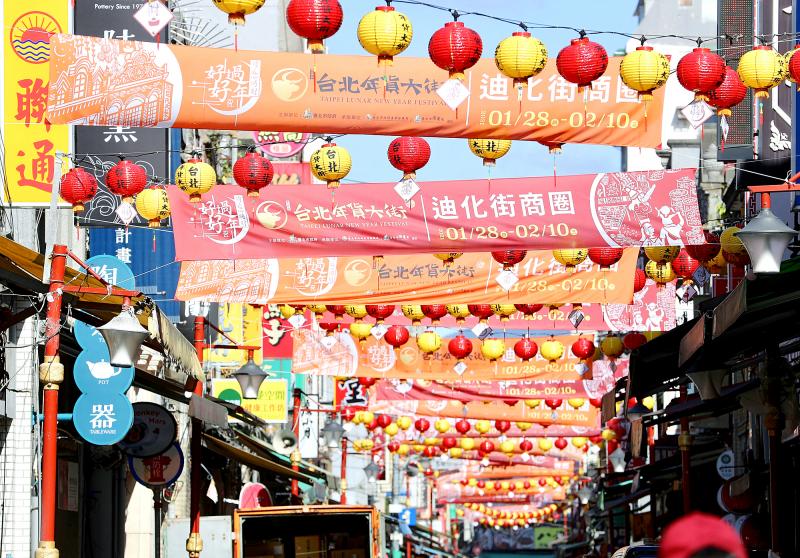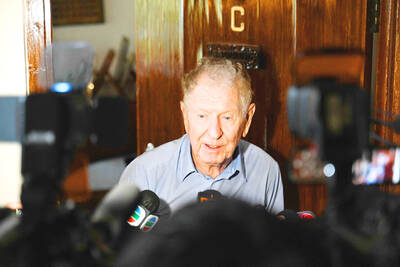The Taipei City Government yesterday canceled this year’s Lunar New Year market on Dihua Street and postponed the Taipei Lantern Festival over COVID-19 concerns.
The market was to open on Thursday next week and run through Feb. 10, while the lantern festival was to run from Feb. 26 to March 7.
Taipei Mayor Ko Wen-je (柯文哲) said that the decisions were made after considering the COVID-19 situation reported by the Central Epidemic Command Center and discussions with city departments.

Photo: CNA
“We think it is inappropriate to hold a large public event at this time, so the Lunar New Year market’s brick-and-mortar activities have been canceled, and the Taipei Lantern Festival postponed,” Ko said.
A cluster of infections linked to a Taoyuan hospital over the past week has spread to family members of healthcare professionals, and the next few days are critical to observe whether local transmission
has occurred, he said.
The lantern festival would be held later in the year, when the virus situation improves, he said.
Taipei Department of Economic Development Commissioner Lin Chung-chieh (林崇傑) said that the online Dihua market would go ahead.
Ko said he has asked Taipei Deputy Mayor Vivian Huang (黃珊珊) to discuss and draft compensation rules for organizers commissioned to prepare major city events if there are further COVID-19 disruptions.
Asked whether the hospital should conduct mass testing, Ko said that testing does not detect the virus in people who are in the early stage of the incubation period.
The purpose of mass testing is to detect asymptomatic carriers, whose number is relatively small, Ko said, adding that disease prevention should be implemented in a cost effective way.
The city government has set up standard operating procedures in case the COVID-19 situation worsens and community spread is confirmed, including temporarily halting meal sharing services for elderly people and limiting the number of people at gatherings, he said.
However, details on the tightened measures do not need to be announced at this time, as they would only frighten people, he said.
Separately, the Ministry of the Interior issued notices to religious groups, asking them to consider suspending large events.
Jenn Lann Temple (鎮瀾宮) in Taichung’s Dajia District (大甲) said that it would not hold an event at which people race to place the first incense in a burner.
The New Taipei City-based Dharma Drum Mountain organization said that it would livestream its annual event on Lunar New Year’s Eve on Feb. 11.
Yunglian Temple (湧蓮寺) in New Taipei City’s Luzhou District (蘆洲) said that it was still discussing whether it would hold its annual events, adding that it would decide by Wednesday next week.
Nanyao Temple (南瑤宮) in Changhua County said that it is suspending its midnight incense run on Feb. 11.
Fusing Temple (福興宮) in Yunlin County’s Xiluo Township (西螺) said it has canceled its run and would instead have a representative place the first incense.
However, it would continue with its hongbao (紅包, “red envelope”) distribution event, although it would mandate that everyone wear a mask on temple grounds.
Fo Guang Shan Temple (佛光山) in Kaohsiung said it has canceled all of its Lunar New Year events.
Tzunan Temple (紫南宮) in Nantou County announced that it is canceling events, while the Yanshui Beehive Fireworks Festival (鹽水蜂炮) in Tainan has also been canceled.
However, Pingtung City, as well as Chaozhou (潮州) and Neipu (內埔) townships in Pingtung County, are going ahead with market events, citing financial losses of more than NT$10 million (US$351,927) if they are canceled.
The Chaozhou Township Office and Pingtung Mayor Lin Hsieh-sung (林協松) said that they would cancel the events if the center orders them to do so.
Additional reporting by Yeh Yung-chien and CNA

MORE VISITORS: The Tourism Administration said that it is seeing positive prospects in its efforts to expand the tourism market in North America and Europe Taiwan has been ranked as the cheapest place in the world to travel to this year, based on a list recommended by NerdWallet. The San Francisco-based personal finance company said that Taiwan topped the list of 16 nations it chose for budget travelers because US tourists do not need visas and travelers can easily have a good meal for less than US$10. A bus ride in Taipei costs just under US$0.50, while subway rides start at US$0.60, the firm said, adding that public transportation in Taiwan is easy to navigate. The firm also called Taiwan a “food lover’s paradise,” citing inexpensive breakfast stalls

US PUBLICATION: The results indicated a change in attitude after a 2023 survey showed 55 percent supported full-scale war to achieve unification, the report said More than half of Chinese were against the use of force to unify with Taiwan under any circumstances, a survey conducted by the Atlanta, Georgia-based Carter Center and Emory University found. The survey results, which were released on Wednesday in a report titled “Sovereignty, Security, & US-China Relations: Chinese Public Opinion,” showed that 55.1 percent of respondents agreed or somewhat agreed that “the Taiwan problem should not be resolved using force under any circumstances,” while 24.5 percent “strongly” or “somewhat” disagreed with the statement. The results indicated a change in attitude after a survey published in “Assessing Public Support for (Non)Peaceful Unification

The CIA has a message for Chinese government officials worried about their place in Chinese President Xi Jinping’s (習近平) government: Come work with us. The agency released two Mandarin-language videos on social media on Thursday inviting disgruntled officials to contact the CIA. The recruitment videos posted on YouTube and X racked up more than 5 million views combined in their first day. The outreach comes as CIA Director John Ratcliffe has vowed to boost the agency’s use of intelligence from human sources and its focus on China, which has recently targeted US officials with its own espionage operations. The videos are “aimed at

Four former Hong Kong opposition lawmakers jailed in the territory’s largest national security case were released yesterday after more than four years in prison, the first among dozens convicted last year to regain their freedom. Former legislators Claudia Mo (毛孟靜), Jeremy Tam (譚文豪), Kwok Ka-ki (郭家麒) and Gary Fan (范國威) were part of a group of 47 public figures — including some of Hong Kong’s best-known democracy advocates — who were charged with subversion in 2021 for holding an informal primary election. The case fell under a National Security Law imposed on the territory by Beijng, and drew international condemnation and warnings